Key takeaways:
- Congestion can be influenced by environmental factors, lifestyle choices, and stress levels, emphasizing the importance of holistic health management.
- Identifying specific symptoms and keeping a personal log can help in managing congestion and understanding triggers, including emotional impacts.
- Effective congestion management strategies include lifestyle changes, home remedies like saline rinses and honey, and knowing when to seek medical advice for persistent symptoms.
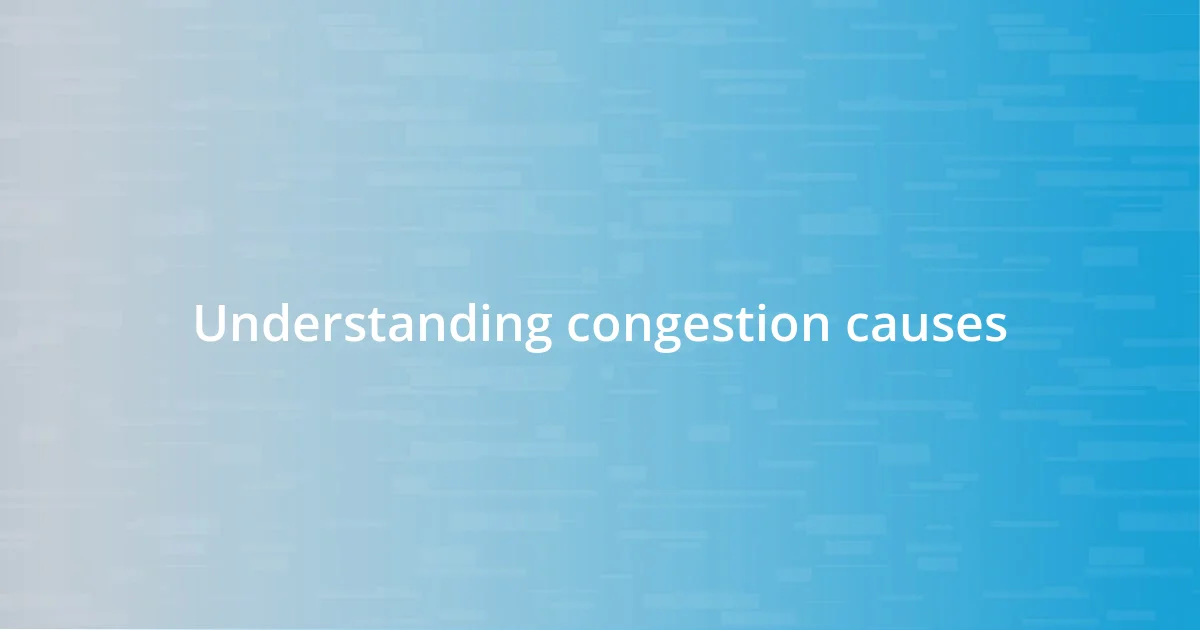
Understanding congestion causes
Congestion often roots itself in a myriad of factors, both environmental and physiological. For instance, I remember the times when my allergies would spike, leading to an uncomfortable stuffiness that made daily tasks feel unbearable. It’s astonishing how something as common as pollen can wreak havoc on our bodies, isn’t it?
Lifestyle choices play a significant role too. When I cut down on processed foods and prioritized hydration, I noticed a substantial decrease in congestion. I often wonder, how many people might feel better simply by re-evaluating their diet? It’s something I find worth exploring because nutrition can truly shift our health landscape.
Additionally, stress can be a silent contributor to congestion. I recall a particularly hectic week at work when my stress levels soared, and my breathing became noticeably labored. It made me ponder how interconnected our mental and physical health really is. Have you ever felt the weight of stress manifest physically? It’s a clarion call to pay attention to our well-being beyond just the physical symptoms.

Identifying personal symptoms
Identifying personal symptoms is crucial for managing congestion effectively. I’ve often found that recognizing specific signs of congestion, like a slight pressure in my forehead or a tickle in my throat, has helped me address the issue early. Sometimes, just taking a moment to check in with my body can make a significant difference.
To pinpoint my symptoms better, I started keeping a simple log. Each time I felt congested, I noted what I was doing, what I had eaten, and even the weather. In doing so, I discovered a pattern: certain foods would trigger symptoms at specific times of the year. It’s fascinating how personal data can illuminate hidden connections, isn’t it?
When congestion strikes, I also pay attention to how I feel emotionally. I’ve realized that irritability can sometimes sneak in when I’m congested, affecting my interactions with others. This deeper awareness of how congestion impacts my mood has been a revelation, reminding me that caring for my body is just as important for my mental health.
| Symptom | Description |
|---|---|
| Pressure in Forehead | Feeling of heaviness in the forehead indicating potential congestion. |
| Throat Tickling | Annoying sensation in the throat that often precedes coughing. |
| Irritability | Increased frustration or short temper linked with physical discomfort. |
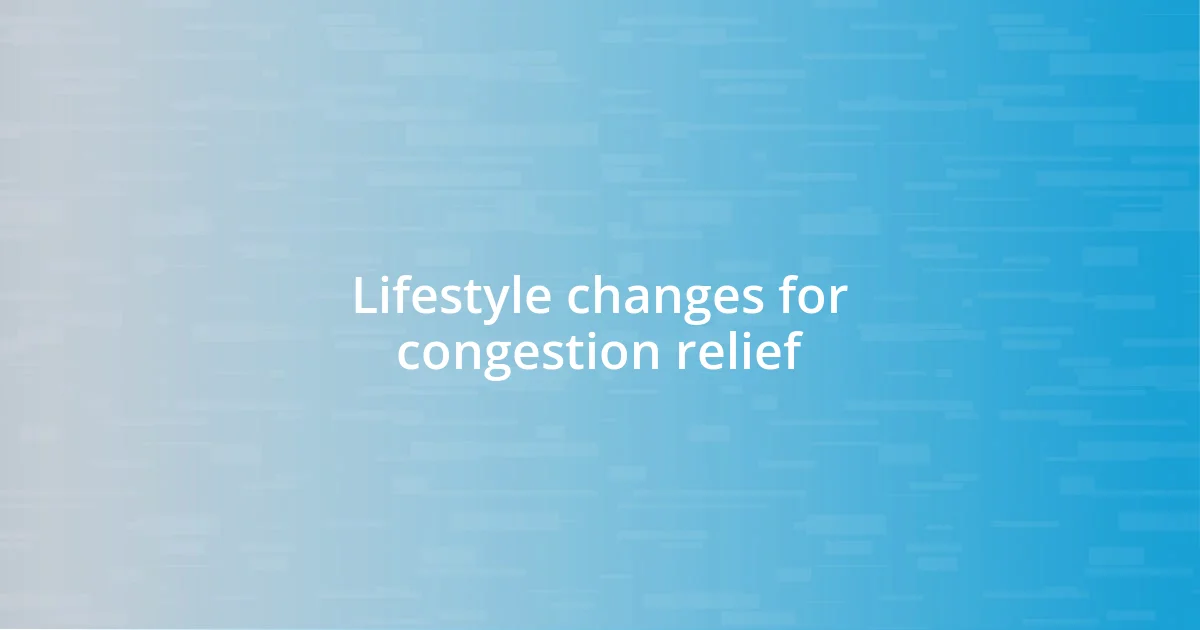
Lifestyle changes for congestion relief
Making lifestyle changes can be a game-changer when it comes to managing congestion. I’ve found that incorporating regular exercise into my routine dramatically improves my respiratory health. After a brisk walk or a yoga session, I often notice my breathing feels freer and my mind clearer. Isn’t it amazing how movement can work wonders on our bodies?
Here are a few lifestyle changes that might help reduce congestion:
- Stay Hydrated: Drinking plenty of water helps thin mucus, making it easier to clear out.
- Utilize Steam: Inhaling steam from a hot shower or a bowl of hot water can provide instant relief.
- Elevate Your Head While Sleeping: Using an extra pillow can prevent mucus from pooling in your sinuses overnight.
- Limit Dairy Intake: For some, reducing dairy products can decrease mucus production.
- Practice Deep Breathing: I personally find that focusing on my breath supports clearer airways and reduces pressure.
Sometimes, I unwind with herbal teas as well. They not only hydrate but also add comforting warmth, which soothes my throat. I remember once sipping a cup of ginger tea while I felt a cold coming on; it felt like a warm hug. Little changes like these can surprisingly make a noticeable difference in how I feel.
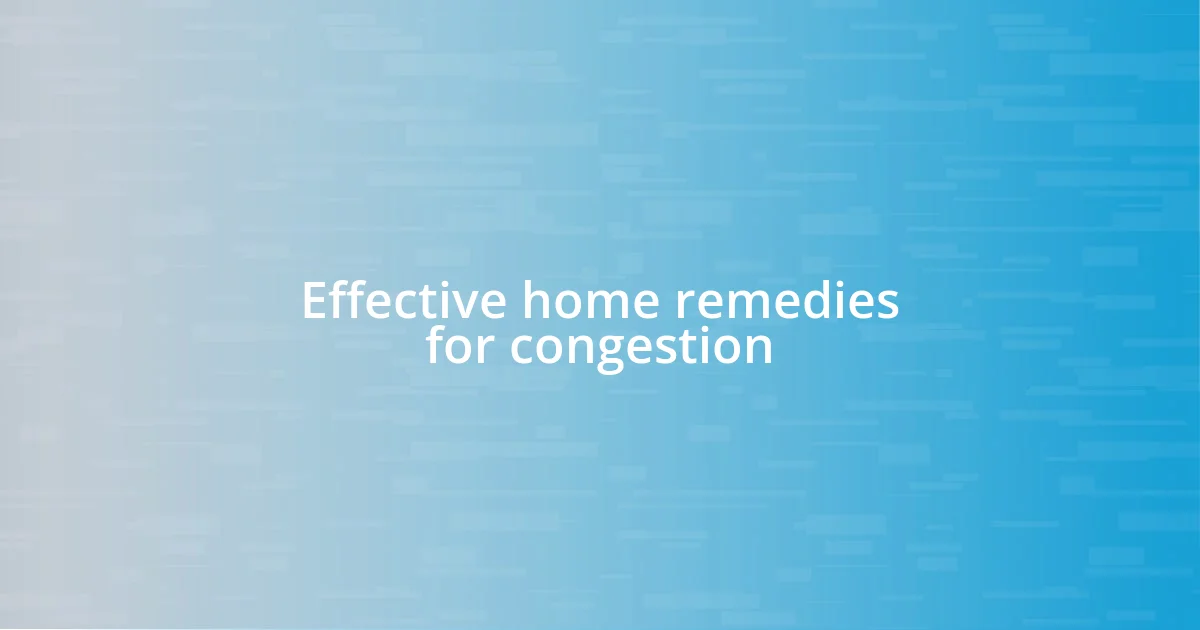
Effective home remedies for congestion
When congestion hits, I often turn to a simple and effective home remedy—saline nasal rinses. I remember the first time I tried it; I was pleasantly surprised at how much clearer my sinuses felt afterward. Just a little bit of salt mixed with warm water in a neti pot can do wonders, flushing out irritants and easing that stubborn pressure. Have you ever felt such instant relief from a simple solution?
Another go-to remedy for me is honey, specifically in warm water or herbal tea. The soothing properties not only comfort my throat but also provide natural anti-inflammatory benefits. I can’t help but smile when I think about those chilly evenings I spent curled up on the couch, sipping a honey-infused drink while reading a book. It’s amazing how a sweet touch can create such warmth, both inside and out.
Last but not least, essential oils have become a staple in my congestion relief toolkit. I find that diffusing eucalyptus oil fills the air with a refreshing scent that also promotes easier breathing. There was a time when I felt overwhelmed with congestion; diffuse or apply eucalyptus oil, and it was like a breath of fresh air. Have you noticed how some scents can transport you back to more comforting times? It’s like I’m creating my own little sanctuary at home when I use them.
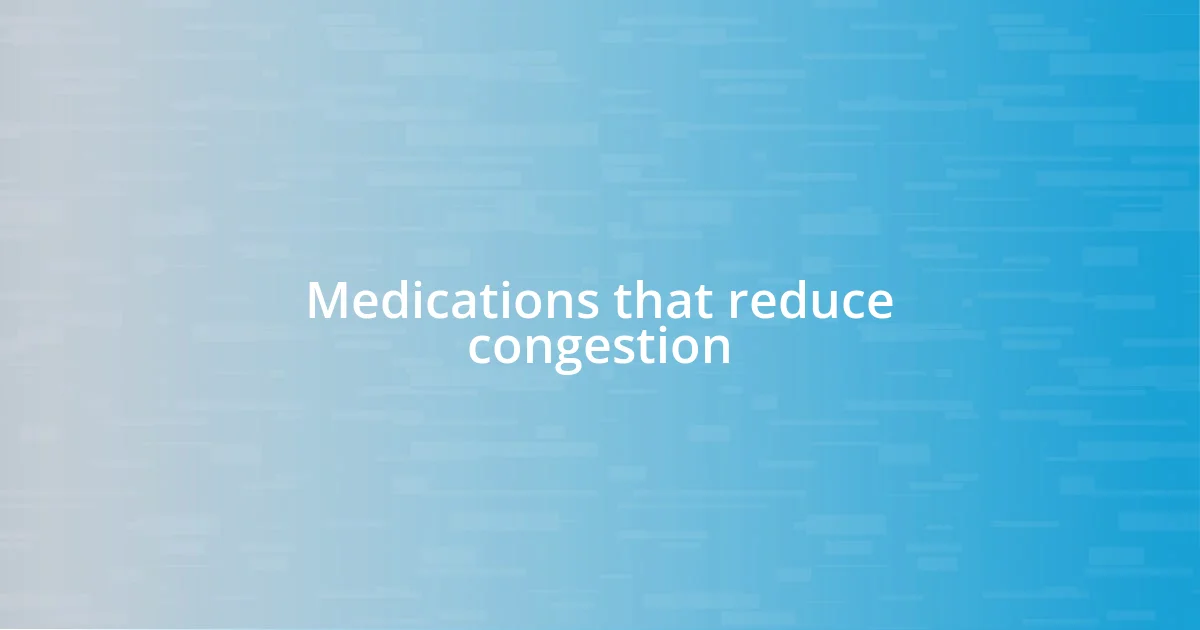
Medications that reduce congestion
Medications can be a vital component in managing congestion, and I often rely on decongestants when I need quick relief. For instance, I remember battling a stubborn cold and reaching for a pseudoephedrine tablet. Within a short span, I felt the pressure lift, and I could finally breathe without straining. Have you experienced that wonderful moment when the fog clears, and you can enjoy a deep breath?
Another option I’ve experimented with is saline nasal sprays. They may seem simple, but they work remarkably well to moisturize and clear nasal passages. I distinctly recall using one during allergy season, and I felt like I was giving my sinuses a refreshing bath. It’s fascinating how something so straightforward can have such a positive impact.
Lastly, I can’t overlook the benefits of antihistamines, especially during allergy outbreaks. I’ll never forget a particularly itchy spring afternoon when I took an oral antihistamine; almost instantly, I felt the irritation subside. It made a chaotic day feel manageable again, reinforcing how the right medication can restore balance in our bodies. It’s empowering to know that there’s help available when congestion strikes!

When to seek medical advice
Sometimes, knowing when to reach out for medical advice can be a bit confusing. If my congestion lasts more than ten days or seems to worsen rather than improve, I’m quick to consult a healthcare professional. I’ve learned that persistent symptoms can signal an underlying issue that requires attention, like a sinus infection or even something more serious.
There was a time when I ignored my symptoms, thinking they would simply go away. However, when I experienced severe headaches and facial pain along with my congestion, I realized it was time to seek help. It’s unsettling to feel our health slipping away; I would rather face a slight embarrassment at the doctor’s office than endure prolonged discomfort. Have you ever felt that pushing through might not be the best choice?
A high fever accompanying congestion also raises red flags for me. The first time I faced this scenario, I was shocked to discover it could indicate something more serious. It’s essential to pay attention to our bodies; sometimes, that little voice nudging us to get a checkup is the wisest guide we can follow. Remember, it’s better to be safe than sorry in matters of health!
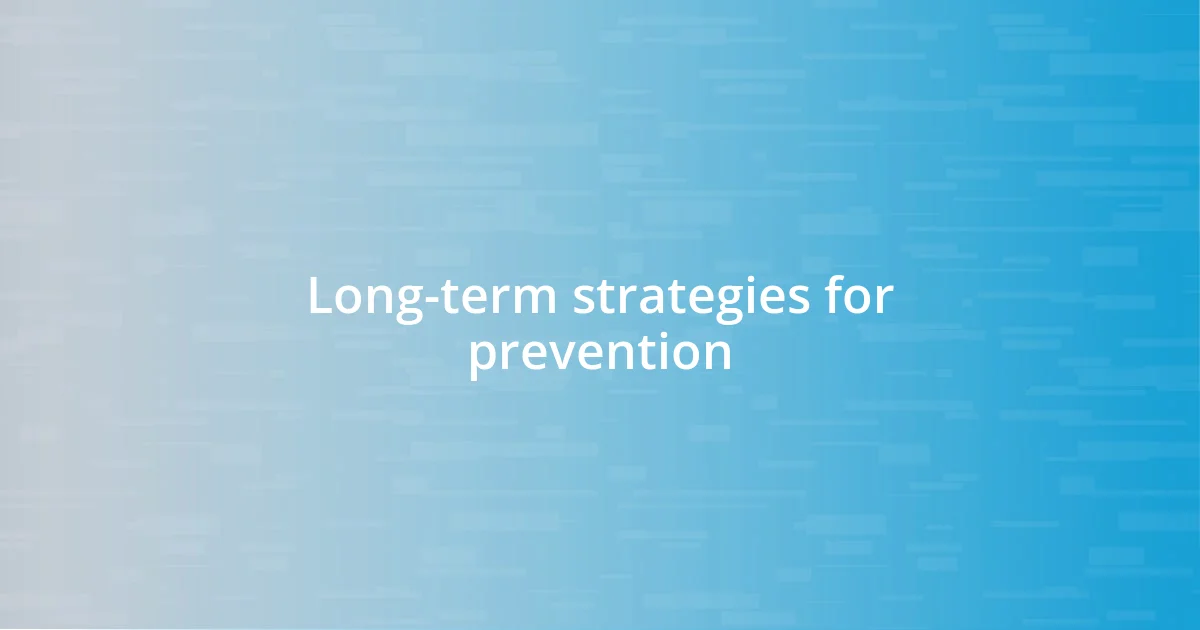
Long-term strategies for prevention
Long-term strategies for preventing congestion can be surprisingly effective when incorporated into daily routines. Personally, I’ve found that maintaining a consistent hydration habit helps keep my mucous membranes moist and functioning well. I can’t stress enough how a simple glass of water can work wonders—have you tried it? It really does make a difference!
Another strategy I swear by is regular nasal irrigation. I was skeptical at first, but once I started using a neti pot, I noticed a significant decrease in my congestion issues. It’s almost like giving my sinuses a reset button. Don’t you love the feeling of clarity after such a refreshing practice?
Lastly, incorporating anti-inflammatory foods into my diet has been a game-changer. I vividly remember the positive shift I felt after making more conscious choices, like adding turmeric and ginger. That little boost of nourishment not only supports my overall health but also seems to fend off those pesky congestion moments. Isn’t it empowering to realize that what we eat can have such a profound effect on how we feel?
















